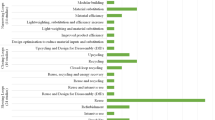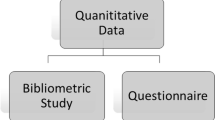Abstract
The primary goal of UNFCCC–COP 21 was to limit global warming to 1.5–2 °C as agenda 2030; whereas India plans to reduce emission intensity by at least 33%, generate 40% electricity by non-fossil fuel source, and create an additional carbon sink of about 2.5 to 3 bn tons. World Bank report estimates India will need to invest $840 billion over the next 15 years to keep up with rising urban infrastructure demand. Considering the growth potential in construction sector and the focus on environmental sustainability aspect, this article attempts to objectively identify challenges, current scenarios, and opportunities in achieving a net zero carbon-built environment model from the conceptual stage through, costing, planning, design, and execution stages at the macro level.
The present article attempts to identify barriers areas under the primary elements of net zero carbon viz., embodied carbon, operational energy, energy source, and demand response. It also attempts to suggest a methodology that can be considered to ensure data disclosure on carbon emission of construction materials, specifically the EPD. Identify and collaborate with various stakeholders who can meaningfully contribute to the creation, review, and validation of the repository and share database which lists the net carbon emission and carbon factors for the materials and resources used in construction. The potential of circularity in reducing net carbon emissions; development and/or utilization of life cycle analysis tools in construction to achieve sustainability and the requirement of the necessary legal framework in the form of code of practice, guidelines, and/or handbook are also discussed.
Access this chapter
Tax calculation will be finalised at checkout
Purchases are for personal use only
Similar content being viewed by others
References
Friedlingstein P, O'Sullivan M, Jones WM, Andrew RM, Gregor L, Hauck J, et al (2021)Our world in data—CO2 emissions, [Online]. Available: https://ourworldindata.org/co2-emissions
United Nation Environment Programme (2020) 2020 Global status report for buildings and construction: towards a zero-emission, efficient and resilient buildings and construction sector. UNEP, Nairobi
Ritchie H, Rosado P (2020)CO2 and greenhouse gas emissions, OurWorldInData.org, [Online]. Available: https://ourworldindata.org/co2-and-greenhouse-gas-emissions
COP21: The key points of the Paris Agreement, Ministry of Europe and Foreign Affairs, France, December 2020, [Online]. Available: https://www.diplomatie.gouv.fr/en/french-foreign-policy/climate-and-environment/the-fight-against-climate-change/2015-paris-climate-conference-cop21/cop21-the-paris-agreement-in-four-key-points/. Accessed Jan 2023
Net Zero Tracker, 10 March 2023, [Online]. Available: https://zerotracker.net/. Accessed 10 March 2023
Masson-Delmotte V, Zhai P, Pörtner DRO, Skea J, Shukla PR, Pirani A, Moufouma-Okia W, Péan C, Pidcock R, Connors S, Matthews JBR, Chen Y, Zhou X, Gomis MI, Lonnoy L, Maycock T, Tignor M, Waterfield T (2022) Global warming of 1.5 °C IPCC special report on impacts of global warming of 1.5 °C above pre-industrial levels in context of strengthening response to climate change, sustainable development, and efforts to eradicate poverty. Cambridge University Press, Cambridge, UK and New York, NY, USA
Pricewaterhouse Coopers (2022) Net Zero Economy Index 2022. PWC LLP, UK
Energy and Climate Intelligence Unit, Net Zero Scorecard, [Online]. Available: https://eciu.net/netzerotracker. Accessed 23 March 2023
Cabinet, Release ID: 1847812 - PIB, [Online]. Available: https://pib.gov.in/PressReleaseIframePage.aspx?PRID=1847812. Accessed 24 March 2023
Bui H, Kőműves Z, Chewpreecha U, Gutzianas I, Stenning J (2022) Getting India to net zero: a report of the high-level policy commission on getting Asia to net zero. The Asia Society Policy Institute, New York
International Finance Corporation (2017) Climate investment opportunities in South Asia. International Finance Corporation, World Bank Group, Washington D C
Conference of the Parties—Twenty-seventh session, United Nation Climate Change—COP 27, Sharm el-Sheikh, 2022
Apel F, Boland B, Motte Hdl, Moore A, Reiter S, Sjödin E (2022) Basic materials practice: accelerating green growth in the built environment. McKinsey and Company
UNEP Press release on Energy, As buildings and construction sector grows, time running out to cut energy use and meet Paris climate goals, UN Environment Programme, 11 December 2017, [Online]. Available: https://www.unep.org/news-and-stories/press-release/buildings-and-construction-sector-grows-time-running-out-cut-energy. Accessed 20 March 2023
Ritchie H, Roser M, Rosado P, Our world data, Global Change Data Lab, August 2022. [Online]. Available: https://ourworldindata.org/co2-and-greenhouse-gas-emissions
Author information
Authors and Affiliations
Corresponding author
Editor information
Editors and Affiliations
Rights and permissions
Copyright information
© 2024 The Author(s), under exclusive license to Springer Nature Singapore Pte Ltd.
About this paper
Cite this paper
Joshi, A.M., Anbumaninathan, N., Shah, V. (2024). Transformation Toward Net Zero Built Environment—Indian Scenario: Challenges and Opportunities. In: Bajaj, D., Gajendran, T., Patil, S. (eds) Sustainable Built Environment. ICSBE 2023. Lecture Notes in Civil Engineering, vol 451. Springer, Singapore. https://doi.org/10.1007/978-981-99-8842-6_4
Download citation
DOI: https://doi.org/10.1007/978-981-99-8842-6_4
Published:
Publisher Name: Springer, Singapore
Print ISBN: 978-981-99-8841-9
Online ISBN: 978-981-99-8842-6
eBook Packages: EngineeringEngineering (R0)




